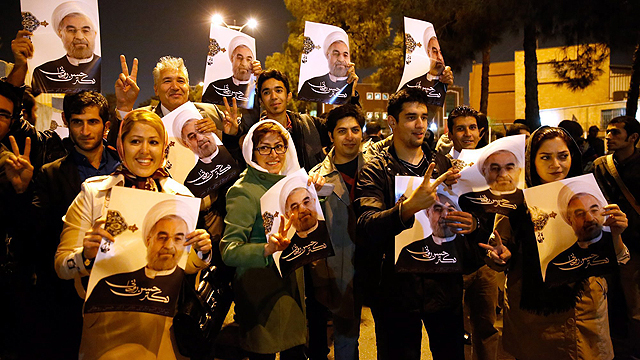
Iranians hail 'smiling' FM as hero of nuclear deal
Citizens of Islamic republic pleased with prospect of eased economic sanctions, laud Foreign Minister Zarif, flood online social networks with greeting
Iranians hopeful that a nuclear deal with world powers will ease their economic woes found a hero in Foreign Minister Mohammad Javad Zarif, showering him with thanks on the internet.
Many had stayed up all night, glued to satellite channels and computer screens for updates on exhaustive negotiations in Geneva that stretched into a fifth day in the early hours of Sunday.
Related stories:
- Secret US-Iran talks set stage for nuclear deal
- Winners and losers of nuclear deal
- Netanyahu calls Iranian deal 'historic mistake'
When news broke out – at around 05:30 am local time – that a historic agreement had been clinched by Iran and six world powers, joyful messages flooded the Internet.
"Thank you negotiators! Thank you Zarif," Tehran student Ahmad tweeted.
"God bless you smiling man," read a message on Zarif's Facebook page, referring to his customary expression. "Your smile has made a nation happy."
Top diplomats from the P5+1 group – Britain, China, France, Russia and the United States plus Germany – had converged on the Swiss city on Saturday as the talks entered a critical stage without a guarantee of success.
On Sunday, they emerged with an interim accord to defuse tensions and buy time for diplomacy, with Iran agreeing to limit uranium enrichment in return for relief on punitive sanctions over its controversial nuclear program.
The rollercoaster ride in Geneva was followed each step of the way by Iranians back home, to see if Zarif could break a nuclear impasse which has affected their lives for the past decade.
Hamed Mohammadi, a private sector employee, said he hoped the deal would translate into a strengthening of Iran's currency, the rial.
"If the rial bounces back, goods will gradually become less expensive," he said, with the currency having lost more than two thirds of its value against the dollar since late 2011 when oil and banking sanctions were imposed.
Those sanctions are not affected by the Geneva deal but many Iranians are now optimistic of a change in dealings with the outside world.
'Livelihoods on the line'
Media outlets made it easier this time to keep Iranians up to date on the latest round of talks – the third such gathering since President Hassan Rohani, a reputed moderate and regime insider, took office in August.
That included state television which – like previously – kicked off news bulletins with live reports from Geneva and voiced support for Zarif and his negotiating team.
Mohyeddin – a carpet seller who like most colleagues in Tehran's Grand Bazaar is close to Iranian politics and foreign policy – said he hoped for a full nuclear agreement within a year.
"Business has been bad and must be revived. It will not happen until all sanctions are lifted," he told AFP.
In street debates, an elderly man dressed to beat the first major cold wave of the season defended the deal in a public debate with a younger man on a packed metro.
"I have seen war. I have experienced its suffering and devastation. We endured that but the sanctions can not go on," said the man.
"Our livelihoods are on the line," he said, referring to the economy, battered by an official inflation rate of nearly 40% and double-digit unemployment.
His challenger, a university student in his twenties, chided the old man for being too soft in confronting "arrogant powers," Iran's term for the West.
"Our nuclear right is a symbol of our resistance, our resolve," said the student.
Iranians want 'other rights as well'
However, the deal was hailed as a victory for Iran by the two most powerful men in the country, supreme leader Ayatollah Ali Khamenei and Rohani.
It provides Iran with limited relief from sanctions and the release of billions of dollars in frozen Iranian assets.
The pros and cons abounded online, particularly on Twitter and Facebook, popular among young Iranians and even some officials, including Zarif, despite being officially banned.
The Internet-savvy and charismatic diplomat regularly posted updates from Geneva, keeping nearly 675,000 followers informed of the latest in the intensive negotiations.
But some of his followers were skeptical of immediate relief until a final deal is clinched.
"I am not opposed to the enrichment right. But I am entitled to other rights as well: the right to have a job, to see the development of my country," wrote Saghar.
She was referring to Iran's insistence on the "right" to enrich uranium that has proved a key obstacle to a settlement between the Islamic republic and international community.
- Receive Ynetnews updates directly to your desktop












